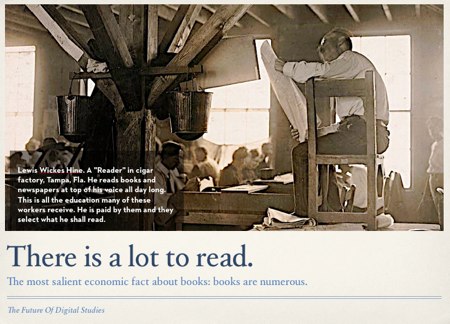Future of Digital Studies: A Lot To Read

Here’s a factory picture from the early twentieth century. Its title is long, but repays attention:
A “Reader” in cigar factory, Tampa, Fla. He reads books and newspapers at top of his voice all day long. This is all the education many of these workers receive. He is paid by them and they select what he shall read.
This was a common practice in the workplace in the 19th and early 20th century. And it’s a good idea, because we all have too much that we ought to read. I wonder how the workers determined what should be read. Did they have campaigns for Dickens or Galsworthy, or Gompers and Debs? Did a few workers annoy their colleagues by advocating “more science” or “another story about Africa”?
All this was wiped out be radio and Musak, of course. It was good while it lasted.
But this communal reading also hides the most important fact in the economy of the book: books are numerous. There’s a lot to read, because it’s not terribly expensive to make a book. If you want to make a movie or build a factory, you need lots of money and lots of help. To make a book, you need a year or two of hard work, some dozens or hundreds of readers, and a way to find a few thousand dollars.
You can’t have feature films about lemurs or Javascript heresies, but there’s no problem writing (or finding) books about them.